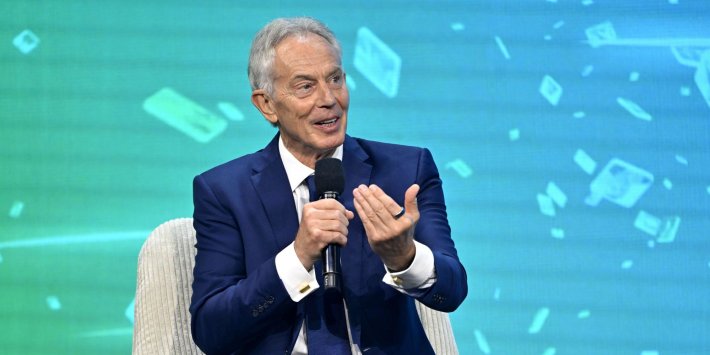
A new report from the Tony Blair Institute has said the government should drop its 2030 clean energy target. (Alamy)
4 min read
The Director of Green Alliance, Shaun Spiers, has criticised the Tony Blair Institute for calling on the government to drop its 2030 clean power target in a new report.
In a new report published on Thursday, the Tony Blair Institute (TBI) said that the government should no longer pursue its goal for clean energy by 2030 – saying the mission required “reform”.
The report refers to a target the government is currently committed to which would seek to ensure Britain’s electricity demand comes almost entirely from clean sources by 2030, with currently only 61 per cent of British electricity doing so.
“Launched in the middle of the gas crisis and in a low-interest environment, it was right for its time, but circumstances have changed,” the TBI report reads.
“The UK now needs more than a decarbonisation plan. It needs a full-spectrum energy strategy built on growth, resilience and abundant clean electricity.
“This means prioritising cost, flexibility and long-term stability – the real building blocks of electrification – not just short-term emissions cuts.”
The think tank, set up by former UK prime minister Tony Blair, has become more influential policy making globally in recent years – including playing a significant role in shaping the Israel-Gaza ceasefire earlier this month.
However, speaking to PoliticsHome, the director of Green Alliance criticised the TBI’s recommendation, admitting the target was “really ambitious” but that it was “a north star that all government is aiming at, and which will have huge dividends”.
“The main message appears to be that the government should give up on its target of clean power by 2030 and sort of move back to more fossil fuel use in the next few years to bring down electricity prices,” said Spiers.
“And we strongly believe a) that you do need to bring down electricity prices… but secondly that the clean power 2030 target is really important for bringing down the cost of energy long term, and for energy security, and for climate change, and for investor confidence.
“And you don’t need to keep chopping and changing… that’s really unhelpful.”
Spiers also questioned “whose interest” the recommendation is serving, citing concerns about the TBI receiving significant funding from figures like billionaire businessman and tech entrepreneur Larry Ellison – who is supportive of US president Donald Trump, a staunch critic of net zero policies and a climate sceptic.
“The Tony Blair Institute is a global institute, it’s got offices in Saudi Arabia – it’s taken a lot of fossil fuel money,” said Spiers.
“It’s taking a lot of money from the Trump supporters; that’s their biggest donor, a big Trump supporter.
“You have to kind of think who’s interest is some of this stuff serving. I don’t think it’s serving the interests of the British people to kind of turn their back on this agenda. “
Responding to Spiers’ remarks, a TBI spokesperson said: “The fact that those who disagree with us choose to attack our motives rather than confront our arguments underlines the weakness of their position.
“The Institute is fully independent – we work in more than 40 countries around the world helping governments, including to deliver clean energy and economic growth. Some of those countries produce oil and gas, some don’t, but all are grappling with the reality of climate change.
“We’re calling for a pragmatic path that delivers for the British people. We are fully committed to clean power and to achieving the UK’s net zero 2050 goal, but we’re in a cost-of-living crisis.
“The priority now is to power economic growth through cheaper, reliable energy, not simply race to 2030 without protecting households.”
More broadly, Spiers said the UK lowering its “ambition on clear power” would be a “huge own goal” if it seeks to lower energy bills and attract investors.
“The UK is the second most attractive market for energy investment in Europe, after France, at a time when investors are committing almost twice as much to clean energy than fossil fuels,” said Spiers.
He added: “The sooner we build more cheap, homegrown renewable energy, the less exposed families will be to another price shock because we’ve left ourselves dependent on fossil fuels imported from hostile regimes.
“Wind power reduced the wholesale price of electricity by 25 per cent in 2024, saving us money on our energy bills and bumping gas off the system.”

